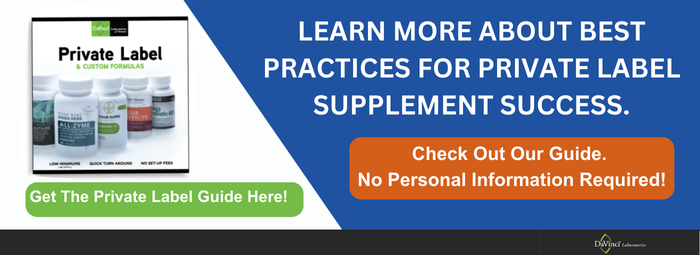
While a private label supplement brand is not crucial to your professional success, it is a great way to boost revenue and expand your client base. If you decide to take this step, having proper insurance coverage in place for your business is crucial.
Private label supplement manufacturers have liability insurance to cover themselves as formula providers. However, other issues could arise for which consumers and patients may blame the vendor of the product. Since you are the owner of your product’s labels, marketing, and storage, we recommend having the right type of insurance coverage in place to avoid any trouble down the line.
what are private label supplements?
Private labeling means putting your brand on existing, high-quality nutritional supplements that come with legal permissions from their provider. In many cases, it’s a win-win for both customers and sellers, as it ensures your buyers get high-quality products and you grow a profitable business.
Private label supplements include research and development, legal considerations, marketing material, and FDA-approved labels. This package saves doctors or business owners considerable time and money in creating a formula from scratch, and allows you to launch your brand quickly.

are private label supplements lucrative?
The answer to this question is a resounding yes.
Simply put: you can make a lot of money with private label supplements. They have low start-up costs and order minimums, so you can test the waters with just a few products. At DaVinci Laboratories, our order minimum is just 36 bottles, which most vendors find quick and easy to turn around. If you’re on the fence about taking this step, start with two or three products you know will sell. For example, if 15-30% of your clients need support for gut health, hormonal balance, or other specific issues, begin with these private label products.
Private label supplements also considerably increase customer loyalty, address your clientele’s specific needs, and boost their confidence in your product. Some suppliers offer marketing support as part of their services, such as label design, production, and support in identifying products that will suit your business. Private label products can also set you up for ongoing passive income from refills.
Along with putting time, energy, and money into starting a successful private label business, having insurance coverage in place to protect yourself is fundamental.
do private label supplements come with insurance coverage?
Overall, selling private label supplements has less liability risk than formulating your own product from scratch because they may be partially protected by the supplier’s compliance and insurance umbrella policy. However, these insurance policies are geared toward covering formula providers rather than individual private label brands, so it’s highly recommended to have an insurance plan in place, as claims can be made against the actual seller, not the private label supplier.
what does insurance protect against?
Whether you are a doctor or business owner selling online, in a retail space, or private practice, the right kind of insurance coverage is essential. Find an insurance broker with experience in the dietary supplement industry—the best protection comes from having product liability and general liability insurance. This combination will help cover the cost of third-party claims for property damage due to your business operations or use of a product and bodily injuries. Some retailers and manufacturers require dietary supplement insurance, and these two types of coverage will ensure you meet those guidelines.
Let’s consider a few examples. If you sell in a brick-and-mortar retail space, someone could slip in your store or a fire could destroy part of a building you rent. In this situation, general liability would make sure you’re covered. Product liability can cover costs if your supplement’s packaging leaks and destroys a piece of furniture or someone chokes on a capsule. Other examples might include allergic reactions, manufacturing defects, mislabeled products, or slip-and-fall accidents.
An experienced insurance provider in the nutraceutical field will usually protect most ingestible supplements, herbs, and vitamin-related products such as energy and protein supplements, compounded and non-compounded herbs, liquids, and topicals.
takeaway
Private label supplements can be profitable, easy to start, and a win-win for your business and clients. But don’t confuse the partial insurance coverage from your private label supplier for full coverage needed as a vendor of third-party products. A supplier’s insurance will protect you as it relates to the manufacturer and distributor of your supplements. Still, everything beyond that needs to be covered by a separate policy.
Look for an insurance company with experience in dietary supplements and a private label provider that is trustworthy and professional.


















